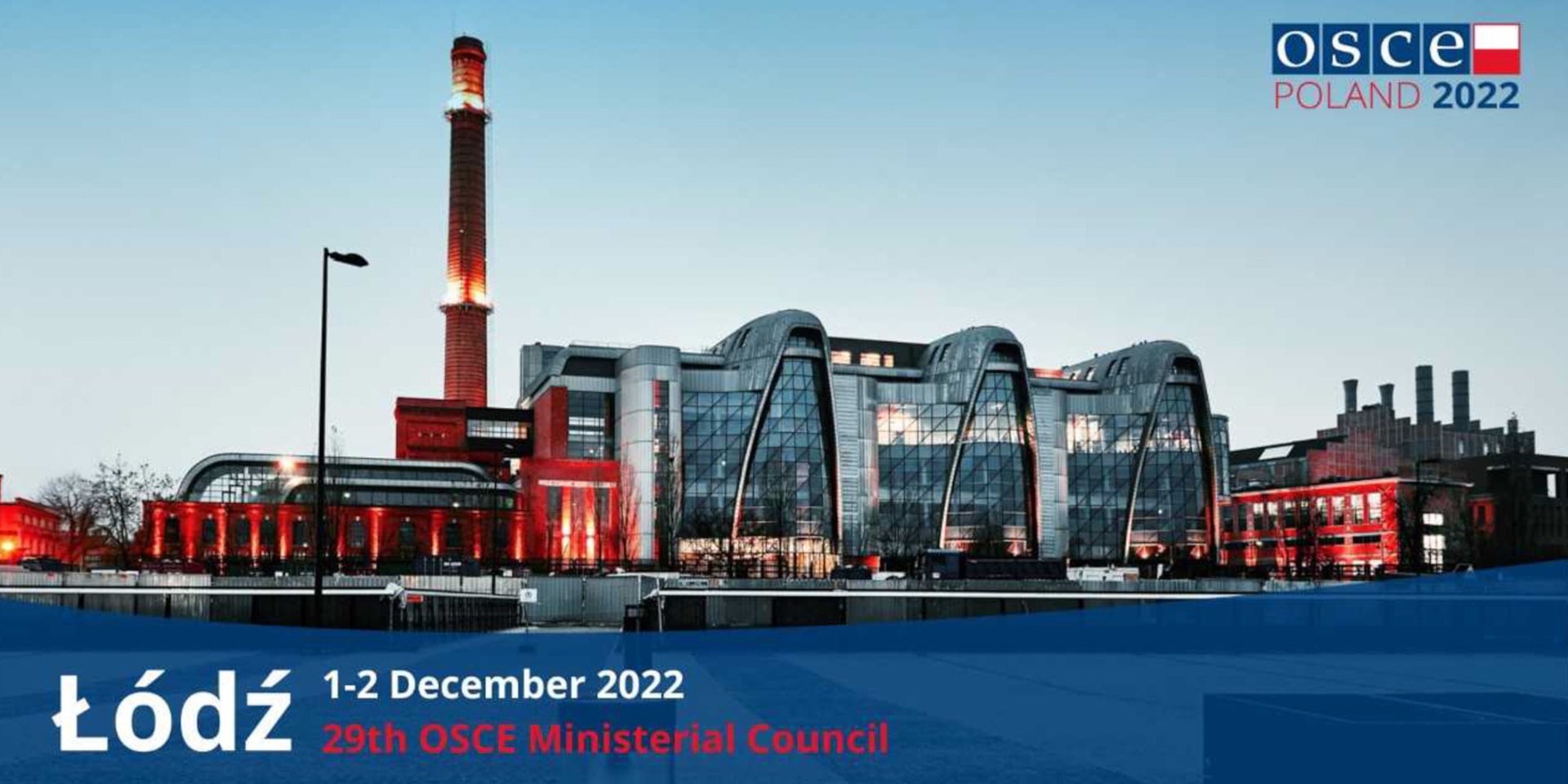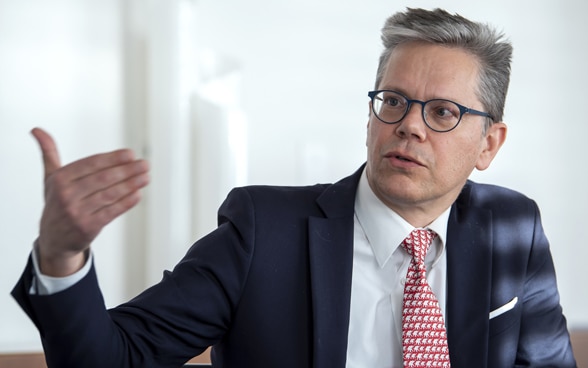"It is essential in the medium term to bring everyone to the table"
Russia's attack on Ukraine has put the Organization for Security and Co-operation in Europe (OSCE) under pressure. According to Raphael Nägeli, Switzerland's Permanent Representative to the OSCE in Vienna, the primary objective of the ministerial meeting in early December is to ensure that the OSCE retains its ability to act. The Ministerial Council will insist on Russia upholding the principles agreed by participating states. But Nägeli also believes that in the medium to long term, European security can only be achieved with Russia's cooperation.

This year's meeting of the OSCE Ministerial Council is taking place in the Polish city of Lodz. © OSCE/Ministry of Foreign Affairs of Poland
The OSCE's primary focus is on security and cooperation in Europe – and Russia's attack on Ukraine has clearly undermined both. What has been the OSCE's response to the invasion? And is there anything else it can do?
Russia's military attack on Ukraine is not just in breach of the OSCE's principles, but also violates the principles of the UN Charter and international law. It has seriously undermined the work of the OSCE, which relies on trust and cooperation.

In this situation, it is essential that the remaining OSCE participating states stand united, condemn Russia's actions and insist, if only verbally, that Russia abide by the principles agreed. So far this approach is working quite well, which was not a foregone conclusion, given the heterogeneity of the OSCE's participating states.
Ensuring that the OSCE retains its ability to act and upholds its own principles are the key challenges to be addressed. Joint commitments continue to apply.
Regarding the OSCE's ability to act: is Russia's status as a participating state obstructing the OSCE's work, or is this rather an opportunity to bring the parties to the conflict to the table?
In the short term, it is making our work much more difficult. The OSCE takes decisions by consensus, so the current conflict is making it very difficult to issue statements of policy and make key personnel and funding decisions. The OSCE nonetheless went ahead with the Warsaw Human Rights Conference. It has also continued its project work in Ukraine, despite Russia's veto, which is being funded through voluntary contributions by a number of OSCE participating states.
It is essential in the medium term to bring everyone to the table: European security can only be achieved with Russia's cooperation. It is also vital to pursue dialogue with Russia. But any dialogue must be based on international law and OSCE principles.
What can Switzerland do within the OSCE to help reinforce European security and cooperation?
Firstly, the weekly meetings of the OSCE Permanent Council, of which Switzerland is a member, serve to remind the international community that international law and OSCE principles continue to apply. It is also essential that we hold Russia to its commitments.
Secondly, we should work to retain and reinforce the instruments at the OSCE's disposal so they remain fit for purpose in future.
Can you give some examples?
Switzerland has supported policy initiatives and made personnel and funding commitments, for example, to help maintain the OSCE's presence in Ukraine and its operations in the South Caucasus and Central Asia and to increase its mediation capabilities. It is essential for the OSCE to prove its continued relevance at this time of heightened tension.
In addition, we have already started planning for when the Ukraine war is over: we aim to ensure that European security continues to be based on cooperation, not just on deterrents and defence alliances, and that the OSCE retains a significant role in Europe's security architecture. Switzerland is at the forefront of ongoing informal discussions.
The Ukraine war is not the only conflict the OSCE is dealing with. What are the other conflicts in which the OSCE is undertaking vital work?
There are various long-standing conflicts on the territory of the former Soviet Union – between Armenia and Azerbaijan, in Georgia and in Moldova. The OSCE's mediation efforts have set up institutionalised formats for dialogue in all three conflicts, which at least make the day-to-day lives of affected communities more bearable and reduce the risk of violent clashes in the regions concerned. Given the current geopolitical tensions, stopping a situation from deteriorating is not a bad result. The open warfare between Armenia and Azerbaijan in 2020 showed how fragile ceasefires can be.
But the OSCE also has field operations in the Western Balkans and Central Asia. These day-to-day efforts in strengthening local governance, securing the participation of minorities, and working with civil society are all vital to preventing conflicts on the ground. The press never covers this work – it only reports on failed operations leading to open warfare, such as the current situation in northern Kosovo.
The Ministerial Council, the OSCE's central decision-making and governing body, is meeting in Łódź, Poland in early December. What can we realistically expect from the meeting?
It is unlikely that any decisions by consensus will be adopted. The meeting will focus mainly on facilitating informal talks between participants. In the face of the Russian threat, the whole of Europe has moved closer together. I'm hoping that the Ministerial Council will take a clear stand and adopt a united stance regarding the OSCE's principles, which are so crucial to Europe's future security architecture.
At the start the year, Switzerland adopted an OSCE Action Plan for the period 2022–25. What has this achieved so far?
The Action Plan aims to strengthen the OSCE's conflict mediation, election monitoring and freedom of the media capabilities. Swiss experts have been recruited and deployed in all these areas. Switzerland has also appointed an expert on the prevention of torture to support the OSCE's human rights work. In terms of cybersecurity, work on a conflict resolution tool for serious cyber incidents has been completed successfully.
The OSCE is the world's largest regional security organisation. You head the OSCE delegation in Vienna. Will the delegation be working more closely with the Swiss Mission to the UN in New York in 2023 and 2024, when Switzerland will be serving on the UN Security Council?
We are already liaising very closely with the Swiss Mission to the UN. We talk on the phone once a week to ensure our agendas are aligned, with the FDFA's UN Division in Bern responsible for coordination. We are currently focusing on conflict zones where the UN and OSCE institutions are involved, i.e. mainly Ukraine, Georgia, Afghanistan and neighbouring Central Asian countries. Of course the OSCE delegation in Vienna also endeavours to support all of Switzerland's key topics for its term on the Security Council, ranging from climate security, peace, women and security, and the New York visit of the OSCE Chairman-in-Office.
